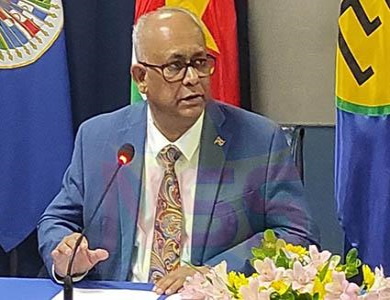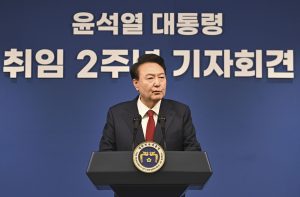PARAMARIBO, Suriname, CMC – Suriname has expressed its support for Guyana in its ongoing border dispute with Venezuela, but acknowledged that its Tigri border issue with its fellow Caribbean Community (CARICOM) country cannot be taken to the International Court of Justice (ICCJ) for a settlement.
“I have said it before and I repeat: Tigri is ours. That is our position. I immediately recognize that the other side has different views. That is why a procedure has been initiated to ensure that, in good consultation with each other to find a solution,” Foreign Affairs, International Business and International Cooperation Minister, Albert Ramdin, told a news conference.
The border commissions of both countries, which have been installed since 2013, are soon to present a final report on the issue and Ramdin said that both countries write to each other when a wrong is perceived to have occurred.
“It’s to build up the file,” Ramdin said, adding “but there is a process through the national commissions that will hopefully lead to recommendations that we can then discuss at a higher level.
“ Hopefully that will lead to a final resolution of the southwest border issue. Once that is resolved, those letters will also remain on,” he said.
Due to the reservation made by Suriname in 1987, the country cannot officially address the matter before the ICJ to indicate, foe example that Guyana submitted a map in its case against Venezuela that does not correctly depict its southeastern border with Suriname.
Ramdin said that a diplomatic note will be sent to Georgetownwith the government pointing out that Guyana has presented an incorrect representation of its southeastern border to the ICJ.
“As long as the parties are still talking to each other, even if it has been about 50 years now, going to a tribunal is not yet an option,” he said.
Ramdin said Suriname is closely monitoring the border dispute between Guyana and Venezuela and believes, like other countries that the dispute should not escalate.
He said endangering regional security will not be tolerated, warning that if an agreement among the countries cannot be reached and the matter gets out of hand to such an extent that it becomes a geopolitical issue, the interests of Suriname and Guyana would fade into the background.
“Our position is that we support the territorial integrity of Guyana as it relates to Essequibo. Suriname is in favor of a peace zone and does not want an armed conflict to arise.
“In these kinds of regional situations you have to help each other, it is an important principle and especially now when you see that the other country that wants to take part of Guyana, would also like to have part of us in the territorial area. Then there is an interest for us to look at this,” Ramdin told reporters.
The leaders of Guyana and Venezuela are due to meet in St Vincent and the Grenadines on Thursday with Georgetown already indicating that ownership of the disputed Essequibo region not a matter to be dealt with during the deliberations.
Guyana’s President Irfaan Ali has already informed the host country as well as Venezuela’s President Nicolas Maduro that Georgetown would await a ruling from the ICJ on the matter.
Last Sunday Venezuela staged a referendum in which it said 95 per cent of the votes cast were in support of the annexation of the Essequibo region and President Maduro announced soon afterwards that foreign companies working in the Essequibo region would have to withdraw within three months.
He said he was also proposing a special law to prohibit all companies that work under Guyana concessions from any transaction and that Caracas would be creating a military unit for the disputed territory but that it would be based in a neighboring Venezuelan state.
Prior to the referendum, the ICJ had ruled that Venezuela must not take any action to seize Essequibo, which has been administered by Guyana for more than a century.
The Essequibo makes up about two-thirds of Guyanese territory and is home to 125,000 of the country’s 800,000 citizens, but is also claimed by Venezuela.
In its ruling, the Court said “unanimously both parties shall refrain from any action which might aggravate or extend the dispute before the court or make it more difficult to resolve”.






More Stories
South Korea’s creates ministry tackling low birth rate
UK exits recession in ‘fragile’ recovery
Weather forecast: Friday, May 10, 2024